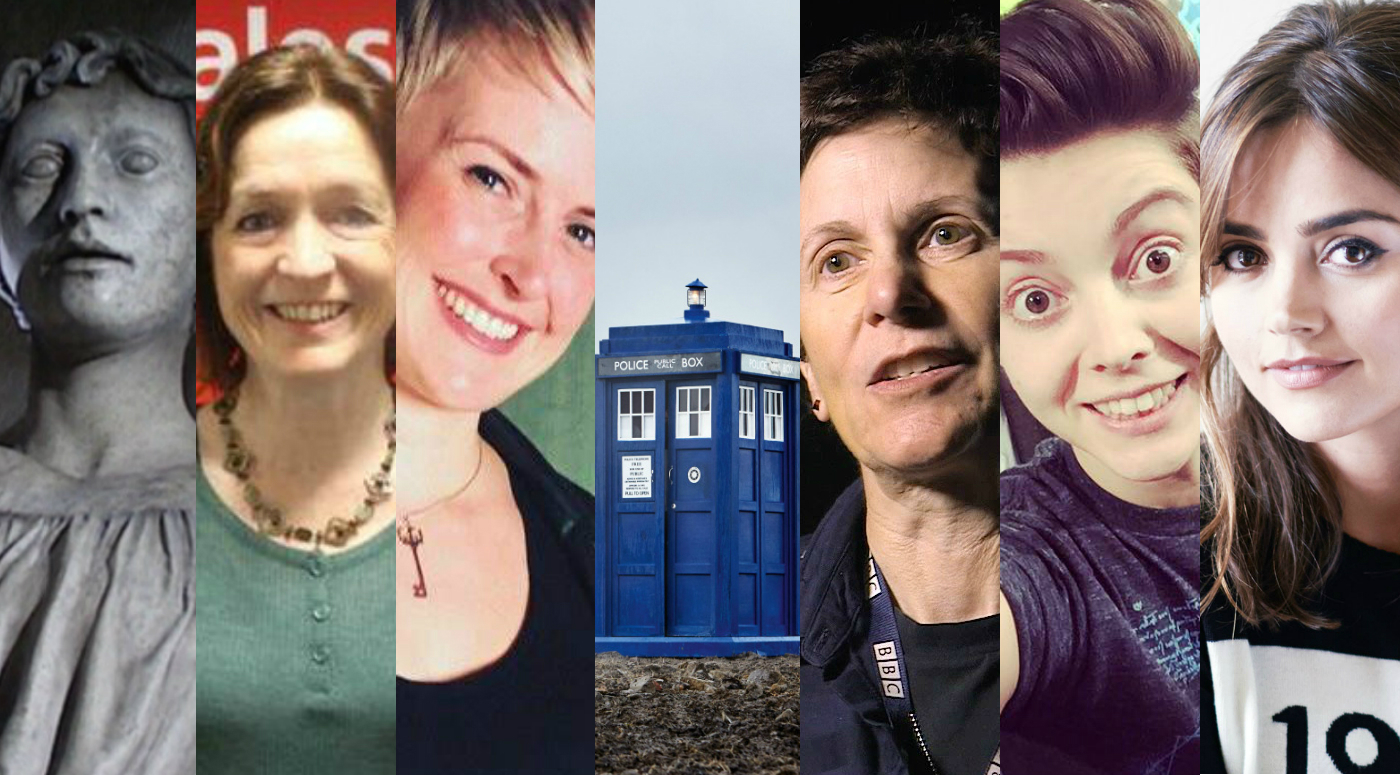
Doctor Who has a bad relationship with women. There are problems with representation. There are problems with agency. There are problems with, if you’ll pardon the expression, putting women in a box. It seems like ever since the show came back in 2005, there have been issues brought up concerning the way many of the show’s creative staff have handled the female role. It’s an area of concern behind the scenes as well, with prominent fans such as Neil Gaiman bringing attention to the dire lack of women involved in Doctor Who’s production as far back as David Tennant’s era.
In many ways, however, series nine was a turning point for the program. Two female writers, two female directors, increasingly well written women in supporting roles, and a remarkably effective story arc leading up to Clara’s exit meant that this series had a noticeably better grasp on the female perspective than most. Not only correcting some of the more egregious flaws of the revival by directly addressing their detractors’ concerns, this series also slipped in some surprisingly feminist themes that no doubt contributed to making the 2015 edition of Doctor Who one of my all-time favourite versions of the program so far.
That success deserves to be celebrated, as do some of the most visibly influential women responsible for the Twelfth Doctor’s sophomore year in the TARDIS. This list unfortunately doesn’t include all women who worked on series nine. Not even all notable ones such as Maisie Williams or Nikki Wilson, brilliant women in their own rights whose contributions have obviously been enormous. Instead, I’d like to focus for the moment on women who we can credit with specific creative achievements involving Doctor Who in the past year, and why these achievements have true and lasting meaning within the context of the show.
Hettie MacDonald (Director)
Hettie MacDonald has been somebody to Doctor Who fans ever since her phenomenal work directing Blink in 2007. Considered by many to be the revival’s seminal episode, it’s easy enough to see why when the story looks and feels so different from anything surrounding it at the time. Dramatic, gothic shadows enveloping characters and David Tennant’s Cronenbergian appearance on the television screen stand in stark contrast to the show’s usual made-for-TV look. Intentionally evoking dread and horror in the audience with this imagery, there’s a real feeling that our lead characters are truly in danger, exacerbated by the viscerally frightening way the Weeping Angels move in abrupt, jerking editorial cuts. This introduction made the Angels a staple villain of the series going forward, and it’s MacDonald’s skills at visualizing new concepts and establishing a tone that were responsible for that success.
Moving forward to series nine, The Magician’s Apprentice / The Witch’s Familiar required a similar set of skills to take the hard-edged, aggressive Twelfth Doctor of series eight and revitalize him for a new, superficially lighter set of madcap adventures in a series featuring deeper storytelling and almost exclusively two part episodes. This was the premiere episode of the new style, and putting that opportunity in MacDonald’s hands was not only a long overdue win for women, but a smart move from the showrunners who knew what MacDonald was capable of delivering.
MacDonald sold it fearlessly by diving in full throttle, giving us magnificent showpieces like the Twelfth Doctor riding into a medieval battleground on a tank playing the Doctor Who theme song on an electric guitar. If nothing else, it certainly made a statement about the show going forward. She gave Capaldi the punk rock edge (and sunglasses) he had been missing, and fans fell in love with the persona he developed over the course this series, proving that a female director can give an episode as badass a tone as any man. These episodes also saw the return of powerful female forces Kate Stewart, UNIT, and Missy, keeping the ball rolling promoting amazing female roles both on and off the screen.
While much can be said to credit Moffatt’s writing, Capaldi’s acting, or even Murray Gold’s music with the success of these episodes, it would be impossible to imagine them without the skilled eye and inventive creativity of a director like Hettie MacDonald. When it came to remaking the Twelfth Doctor, she set the tone. The rest followed forward from the path she set.
Catherine Tregenna (Writer)
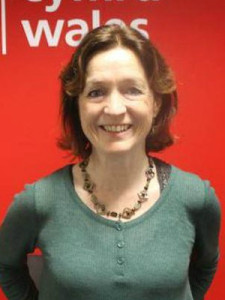 It’s honestly astounding that before this season started there had not been one female writer working on Doctor Who for eight years. In terms of putting a voice to a character, no member of the production has as much influence as the writer, and not allowing the female perspective to come through in all that time still seems fundamentally wrong. It was therefore fitting to finally see a woman’s name credited on The Woman Who Lived, an episode told as much from Lady Me’s point of view as it was from the Doctor’s. In this intensely character-driven episode, Catherine Tregenna answered the question of what happens to a character after the Doctor leaves them behind. What are the consequences of his rash, sudden judgements? What kind of mark do his actions leave on a real human being locked in space and time?
It’s honestly astounding that before this season started there had not been one female writer working on Doctor Who for eight years. In terms of putting a voice to a character, no member of the production has as much influence as the writer, and not allowing the female perspective to come through in all that time still seems fundamentally wrong. It was therefore fitting to finally see a woman’s name credited on The Woman Who Lived, an episode told as much from Lady Me’s point of view as it was from the Doctor’s. In this intensely character-driven episode, Catherine Tregenna answered the question of what happens to a character after the Doctor leaves them behind. What are the consequences of his rash, sudden judgements? What kind of mark do his actions leave on a real human being locked in space and time?
Tregenna previously wrote four episodes for Torchwood, Doctor Who’s more adult spin-off produced by Russell T. Davis. While that work stands on it’s own for featuring significant advancements in the emotional lives of its characters (and garnering a well-deserved Hugo nomination), Tregenna’s first turn penning Doctor Who proper delivers a similarly resonant story which finds its feet in the character arc of its morally grey protagonist. Tregenna’s perspective feeds into Me, as the character previously known as Ashildir opens up to the Doctor about the years she spent waiting and reveals both her rage and frustration at the consequences of him taking away the agency of her own death. Where the Doctor may have intended it to be a second chance for Ashildir, Me carried on with her own life on her own terms, terms which increasingly influenced by the constant loss she witnessed all around her.
These thoughts and feelings, coming from a male writer, could still have shone through with the right script, but they would have lacked a certain punch. It’s a character arc that’s strongly anti-patriarchy, and although I, as a male viewer, appreciate it, I doubt it could be truly understood from a perspective of male privilege. In this regard, Tregenna gives a genuine authenticity to the role. It’s a perspective that Steven Moffat and the other producers seemed to understand going into production, as Tregenna was approached specifically for the aspects that Moffat himself couldn’t deliver:
“They approached me because they had a particular female character in mind … I think they knew the kinds of things that interested me as a writer … You’ve got a woman and a man. He gets to travel about and time travel and she’s living a linear longevity so it’s immortality but it’s day to day and so those themes really were quite fun to explore ” – Catherine Tregenna
The episode ends with Me’s vow to protect the universe from the Doctor, becoming a recurring morally grey antagonist/ally. It’s a position that no character has really yet taken on, and offered unique possibilities for the stories that came after. When we saw Me return later in both Face the Raven and Hell Bent, the themes from The Woman Who Lived stuck with us, remembering the powerful storytelling that made us feel her pain. Catherine Tregenna is heavily responsible for this brilliant characterization.
Sarah Dollard (Writer)
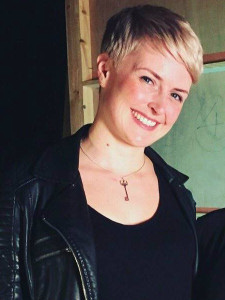 Sarah Dollard holds distinction not only for being the second woman to write for series nine of Doctor Who, but her inclusion in the lineup also makes it the first time two women have written for the same series of Doctor Who at all in the program’s history. A die-hard fan of the program, Dollard has long been a member of the fan community, often cosplaying as Donna at conventions and participating in discussions about the show online. Face the Raven marks the first time she’s been involved in a professional capacity, and it’s an episode that resonated the most with fans for its emotional climax, tying into the end of the series’ epic two-part finale so much that many fans have considered these episodes a trilogy. In interviews after the episode aired, Dollard tells her story of tearing up talking about the Doctor/Companion relationship in the process it took her to land the gig. Seeing Dollard become so passionate about how the companion (nine times out of ten a female role) and the Doctor interact, it was a benefit to all of us that she handled Clara’s final farewell.
Sarah Dollard holds distinction not only for being the second woman to write for series nine of Doctor Who, but her inclusion in the lineup also makes it the first time two women have written for the same series of Doctor Who at all in the program’s history. A die-hard fan of the program, Dollard has long been a member of the fan community, often cosplaying as Donna at conventions and participating in discussions about the show online. Face the Raven marks the first time she’s been involved in a professional capacity, and it’s an episode that resonated the most with fans for its emotional climax, tying into the end of the series’ epic two-part finale so much that many fans have considered these episodes a trilogy. In interviews after the episode aired, Dollard tells her story of tearing up talking about the Doctor/Companion relationship in the process it took her to land the gig. Seeing Dollard become so passionate about how the companion (nine times out of ten a female role) and the Doctor interact, it was a benefit to all of us that she handled Clara’s final farewell.
In Face the Raven, Clara departed from the Doctor in an amazing character moment that was built up throughout the season. It was a strong, moving exit, in which Clara’s mantra of “be brave” felt genuine, tinged with fear and finality. Obviously Coleman added something to that in how she played the part, but the core of that moment came from Dollard. How she stood up to the Doctor, admitting that what she had done was her choice and demanding that he didn’t take vengeance was one of the most important singular moments of the program. In an interview with Whovian Feminism in February, Dollard discussed about her intentions while writing for the series and how much responsibility she felt writing for Clara’s departure.
“I think, with TV in general, you can fall into a trap that when a female character dies, it’s more about the impact on the male characters or the male protagonist. There’s a lot of concern about the trope of fridging, and I’m really aware of that. That was all swirling in my head as potential traps I could fall into.” – Sarah Dollard
This is what I will always talk about when I bring up agency in a series. Is this character acting on her own behalf, or is she merely a tool to further someone else’s story? In terms of Doctor Who, we often only see how storylines effect the Doctor. Think about how the Doctor drew strength from Jenny’s death in The Doctor’s Daughter, the way his story was effected by Donna’s mind being wiped in Journey’s End. Even this last season, O’Donnell’s death in Before the Flood was just the motivator for how Bennett interacted with the Doctor for the remainder of the episode. Just a tool for someone else’s story. That’s never who Clara Oswald was, and I’m glad the issue was on Dollard’s mind:
“For me it was incredibly important, before I even put a word on the page, to think about how it would be Clara’s episode and how it would not just be Clara’s death but Clara’s scene. That she would own it, that she would have agency. One of the first things that I wrote for that scene was “You’re reckless all the bloody time, why can’t I be like you?” I’m sensitive to those issues because those are the issues that upset me in the media I love the most.” – Sarah Dollard
Clara’s had her share of departure episodes (somewhere around eight, at last count) but Face the Raven was one of the most important because of this sentiment of making it her choice. Although caught up in her own hubris of emulating the Doctor, ultimately accepting death was Clara’s decision, and her confident stride towards her own unavoidable fate made her an equal to the Doctor in every way. Running is often the companion’s role within the series. “When I say run, run”, after all, but Dollard made sure Clara showed, in her final moments, that she was able to stand her ground.
Rachel Talalay (Director)
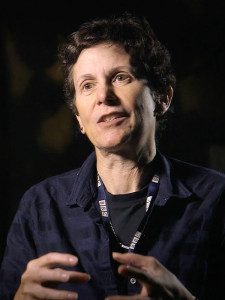 When Rachel Talalay came back to direct Doctor Who this year for the two-part series finale Heaven Sent / Hell Bent, she came to the job with an already impressive resume. In some circles, naming her as the director of Tank Girl would be credit enough to understand her power in making Doctor Who an opportunity for feminist themes. Her relationship with the Nightmare on Elm Street franchise and nearly 20 years of directing television should make her a household name. But it’s Doctor Who that gets me talking about her today. The first American and only seventh woman to direct for the series, Talalay’s efforts have brought a distinct vision to the series that casts its influence over the entirety of Peter Capaldi’s run as the Twelfth Doctor.
When Rachel Talalay came back to direct Doctor Who this year for the two-part series finale Heaven Sent / Hell Bent, she came to the job with an already impressive resume. In some circles, naming her as the director of Tank Girl would be credit enough to understand her power in making Doctor Who an opportunity for feminist themes. Her relationship with the Nightmare on Elm Street franchise and nearly 20 years of directing television should make her a household name. But it’s Doctor Who that gets me talking about her today. The first American and only seventh woman to direct for the series, Talalay’s efforts have brought a distinct vision to the series that casts its influence over the entirety of Peter Capaldi’s run as the Twelfth Doctor.
Her episodes all have a distinct cinematic quality. Think of the scene where Clara wakes up in a graveyard of cybermen in last year’s Death in Heaven. We start with Clara alone, but as she stands the camera slowly zooms out to find her surrounded by shuffling, zombie-like Cybermen, revealing her situation to the audience at the same time as the character. Consider the shot in Heaven Sent where Capaldi sits alone at an elaborately long table, eating soup. The spoon echoes with the sound of each incarnation that’s been there before. In Talalay’s vision, each scene, each shot, is about more than simply moving the plot from A to B. It’s an intentionally planned sequence giving meaning to the actions of its characters as well as their words.
This year, Talalay was given the task of directing what is likely the show’s most conceptually difficult episode to date, Heaven Sent, featuring the Twelfth Doctor completely on his own for 55 solid minutes. As you can imagine, this was one of the most collaborative episodes between actor and director as Capaldi was apparently completely open to discussing each scene and character moment of the episode with Talalay to derive its intention. Throughout his time onscreen, Talalay used the episode to explore his character, his grief, even the lines on Capaldi’s face through studied visual storytelling. She was, admittedly, given a remarkable script, and a high calibre actor in Peter Capaldi. Yet what she brought to the table is unmistakable. If anybody got the honour of directing an episode as beautifully constructed as Heaven Sent, it deserved to be her.
Even now, over four months after the original airdate, Talalay is performing “aftercare” for fans of her episodes by blogging about her process, thoughts about the show, and the impact those episodes have had. Making herself visible and public to both questions and criticism, Talalay truly embraces the show’s fandom. Although careful not to give too much away to spoil the magic, she is astoundingly generous with the behind the scenes content, opening up discussions of what her episodes really mean and what they mean to her versus how they’ve been interpreted. Talalay is GOOD. Not just “good for a girl” but possibly the best director Doctor Who has ever had. There’s a reason I kept hearing her name thrown around by fans when discussing who the next showrunner (a job which pretty much always goes to a writer) should be.
Christel Dee (Presenter)
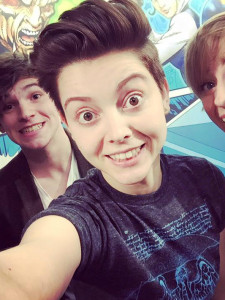 2015 also saw the launch of Doctor Who: The Fan Show. This webseries is presented by Christel Dee of Five Who Fans, a prominent YouTuber and longtime fan of Doctor Who. 24 year old Dee uses her show as a platform to discuss episodes, interview members of the cast, and explore all the various areas of Whovian fandom as it’s known in our current universe. As host, it’s clear that Dee is excited about the show and her enthusiasm is infectious. Her presentation style is high-energy, positive, and she brings such an incredible amount of personality to the show in the form of skits, vlogs, and of course highlighting all the amazing fan projects sprouting from around the internet that it’s impossible not to become engaged.
2015 also saw the launch of Doctor Who: The Fan Show. This webseries is presented by Christel Dee of Five Who Fans, a prominent YouTuber and longtime fan of Doctor Who. 24 year old Dee uses her show as a platform to discuss episodes, interview members of the cast, and explore all the various areas of Whovian fandom as it’s known in our current universe. As host, it’s clear that Dee is excited about the show and her enthusiasm is infectious. Her presentation style is high-energy, positive, and she brings such an incredible amount of personality to the show in the form of skits, vlogs, and of course highlighting all the amazing fan projects sprouting from around the internet that it’s impossible not to become engaged.
While some may dismiss this inclusion as not being truly a part Doctor Who as we know it, I’d like readers to imagine what it must be like for a young girl watching the series for the first time. She falls in love with the TARDIS, the Doctor, the Daleks, like we all have. But she has boys at school who tell her that she’s not allowed. That science fiction is meant for boys only. Now imagine that girl finding herself watching The Fan Show and seeing Christel Dee, a confident woman who can talk about both the new and classic series with ease and seems 100% at home dressed in a brown pinstriped suit and duster. See why it’s important?
The Fan Show is officially produced by the BBC. It’s a concentrated engagement with their fanbase and it would have been so easy for the corporation to put a man in charge like AMC did with Chris Hardwick for The Talking Dead. Even if it is just a strange little show on the internet, try to remember that Doctor Who is really just a strange little show on TV. Dee is making being a female fan of Doctor Who easier than it’s ever been before. Keep in mind also, The Fan Show will probably continue to be the only official Doctor Who content we get until the Christmas Special at the end of this year. It’s a way to keep the show alive and embrace all the amazing things the community is doing to celebrate a series we love. Besides all that, it’s hard to argue about the appeal of someone even Peter Capaldi called “the best hair on TV”.
Jenna Coleman (Actress)
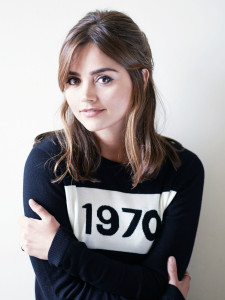 Clara. Oh, Clara. She’s the one woman on this list I know won’t be continuing on with the program for series ten, and as excited as I am for a new companion to step aboard the TARDIS, it breaks my heart knowing what it means to be leaving her behind. As Clara, Jenna Coleman expressed joy and wonder at the universe, fully embracing the madness and thrill of danger that makes this show what it is almost as much as the Doctor does week after week. She was the character who came closest to matching the Doctor in terms of critical thinking and wit. In episodes such as last year’s Flatline and Death in Heaven, she showed herself capable of being the Doctor in his absence, a point which had many fans conflicted over what the “role” of the companion should be.
Clara. Oh, Clara. She’s the one woman on this list I know won’t be continuing on with the program for series ten, and as excited as I am for a new companion to step aboard the TARDIS, it breaks my heart knowing what it means to be leaving her behind. As Clara, Jenna Coleman expressed joy and wonder at the universe, fully embracing the madness and thrill of danger that makes this show what it is almost as much as the Doctor does week after week. She was the character who came closest to matching the Doctor in terms of critical thinking and wit. In episodes such as last year’s Flatline and Death in Heaven, she showed herself capable of being the Doctor in his absence, a point which had many fans conflicted over what the “role” of the companion should be.
More than that, however, Jenna Coleman and Peter Capaldi showed a genuine respect and admiration for each other, embracing each other as leads within a series that is, by its very nature, transitory. Each exit reminds us of how, in the world of actors, scripts, and cameras at least, Doctor and Companion really are on equal footing. Companions change, Doctors regenerate, and the show carries bravely on without either of them.
I’ve already spoken about the agency that Clara was given in her exit when discussing Sarah Dollard and Rachel Talalay, but her character was also defined just as much by being so determined not to leave. With an astounding eight prior potential exits from the series, some weary fans simply wanted to see Clara gone and done with. I agree the character shouldn’t come back after such a marvelous finale, but it’s not because I’ll be happy to see her go. Coleman fought all the usual write outs, making it necessary, by the time she actually left, for the character to leave in such a spectacular fashion that she brought the whole universe crashing down around her.
I’ll miss Clara. Although I couldn’t have cared less about her during series seven’s Impossible Girl arc, her ultimate form was a wonderful character and I truly believe Jenna Coleman will get her due in time for the magic she brought to her role. If Capaldi was channelling his best Fourth Doctor this past series, Coleman was this generation’s Sarah Jane.
The Final Picture
Is Doctor Who perfect now? No. Obviously not. Bethany Black was celebrated earlier in 2015 as the show’s first transgender actress, but her role in Sleep No More diminished her gender identity by making her character a thing. The character of O’Donnell started out brilliantly, even taking a trip in the TARDIS that made her (and viewers) bounce with joy, but her death was ultimately used as a tool to further the arc of a male character’s grief. And the series absolutely needs more input from POC voices in order to de-whitewash what is a supposedly endless expanse of space and time.
But as a whole, it’s taking major steps forward. Actions, after all, speak louder than words, and series nine took definitive action in promoting women into driving roles of the show’s production. Of a total thirteen episodes, eight had a female presence in either writing or directing the story. Keeping women in these positions will ensure we don’t end up with more unintentional mistakes like Love and Monsters or Kill the Moon. We have Christel Dee welcoming new fans into the series and Jenna Coleman bowing out for a new road to be paved by her successor.
Capaldi himself has spoken up on that last point, stressing how the role of the companion should be a doorway for female viewers, and firmly striking out the possibility of an all-male TARDIS team for the reason that it would remove a much needed voice from the series that represents a huge chunk of the fanbase. As the face of the show, it’s great that the way he’s choosing to wield that power is as an ally in keeping available spaces for women present. To let fans like me know the future is in safe hands. That’s such a Doctor thing to do.
Will the trend of empowering women in Doctor Who continue into Series 10? I hope so. I hope the brilliant work of these women was noticed and that the BBC understands the importance of keeping a show like this inclusive to all genders. In one of her blog posts, Rachel Talalay shares a story about something Steven Moffat told her on the final days of filming Hell Bent. I hope its message is the same for all creative women, included on this list or otherwise:
“You’re not done with Doctor Who”
EDIT: The original posting of this article contained a picture of Philippa Lowthorpe instead of Hettie MacDonald. We apologize for any confusion and are working on a replacement image for this article.



![[CRAFTS] DISNEY IS CRACKING DOWN ON ETSY STORES SELLING HANDMADE BABY YODAS](https://geekd-out.com/wp-content/uploads/2019/11/Baby-Yoda-Etsy-150x150.png)
One thought on “Women of the TARDIS: A Guide To Doctor Who’s Surprisingly Feminist Series Nine”